Experts discuss regional innovation at event organised by INESC TEC
International seminar highlights regional innovation policies
Regional innovation policies – this was the main theme of the international seminar organised by INESC TEC that brought to the city of Porto 120 experts from all over the world. The 7th International Seminar on Regional Innovation Policies (RIP 2012), which took place on 11 and 12 October, is proof of INESC TEC’s capacity to bring to bring to Portugal international and socially relevant initiatives.
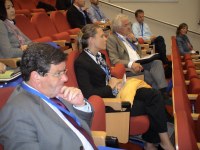
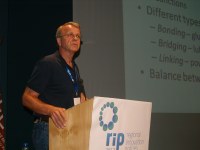
Regions discussed in international seminar
Regions and innovation policies were the main theme of the 7th edition of the RIP. The event took place at the Faculty of Engineering of the University of Porto (FEUP) and brought to Portugal 120 experts – from academia, interface institutions, companies and public administration – from 22 different countries, such as the USA and Kazakhstan. The international meeting, organised by INESC TEC’s Innovation and Technology Transfer Unit (UITT), was part of a cycle of conferences promoted by the Regional Innovation Policies network, set up by the Universities of Porto, Salzburg, Cantabria, Napier Edinburgh, Agder and Lund. The role that policies can play in improving and making the best of the specificities of each region, as well as in creating and operating an innovation and competitiveness strategy for regions were the issues highlighted at the event.
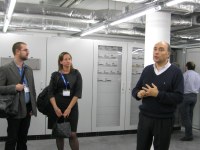
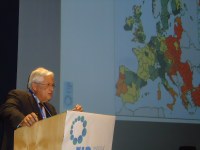
How is it possible to turn each region’s features into economic value and into a differentiating factor for innovation generated and promoted at the universities, companies and R&D institutes? How can regional policies empower territories? How can the different players work to develop a common innovation strategy? These were the questions that participants tried to answer during the two-day event. The programme included five invited speakers: Björn Asheim (CIRCLE – University of Lund, Sweden), David Wolfe (University of Toronto, Canada), Knut Koschatzky (Fraunhofer ISI, Germany), Marko Torkkeli (Lappenraanta University of Technology, Finland) and Augusto Mateus (Augusto Mateus & Associados, Portugal). The role that regional agencies play in terms of development in Canada and the position of Scandinavian Higher Education Institutions were some of the specific cases addressed in the five plenary sessions in the Programme.
Being innovative in innovation
Other than the plenary sessions, other parallel sessions formed a diversified programme which included a visit to INESC TEC. The participants were clearly impressed by the new electric mobility and microgeneration laboratory at INESC TEC. Augusto Mateus was the one in charge of closing the RIP 2012. For this professor, “those who look at the University of Porto and INESC TEC can only believe that the north of Portugal has potential and is driven by creativity”. Policies are much more effective at a regional level and “not the big, general and ‘pretty’ agendas that never get implemented”, Augusto Mateus believes.
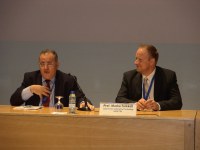
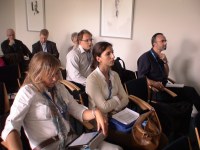
At a regional level there is much more proximity between decision-makers, and therefore it is easier to go from planning to implementing. The purpose of this meeting was to confirm that the potential is in the regions. According to Augusto Mateus, “only this way can Portugal get out of this economic crisis”. Regional policies should “innovate in innovation” adopting a “downside strategy so that it is possible to find better solutions for development at lower costs”, he adds. This is the path to effectively put innovation in agendas and thus “create things that are useful to society”, he concludes. INESC TEC’s contribution to innovation in northern Portugal seems, therefore, unquestionable as this institution is known for transferring relevant knowledge – and incubating companies –, and applying it in a way that promotes economic growth that society can benefit from.
Have your say

- Mário Rui Silva (RIP 2012 Chairman, Professor at the Faculty of Economics of the University of Porto – FEP)
“For the 7th edition of the RIP, I would like to highlight the number, diversity and quality of the participants: more than 100 people from over 20 countries, including internationally renowned members of academia and high quality consultants representing the European Commission and several Governments. This confirms the relevance of the regions when it comes to implementing and managing Innovation Systems. Furthermore, industry and service clusters are better structured at a regional level and the proximity between important players is the best way to build bridges between knowledge and economy.
On this last aspect, and speaking as a founding member of the international network that promotes these seminars, I would like to stress that the message transmitted to me by participants is that INESC TEC’s dimension and solid activity in the technology transfer domain and in the relationship between university and industry are at the level of the best practices worldwide.

- Andreia Passos (UITT/INESC TEC, organização local RIP 2012)
“INESC TEC is a multidisciplinary R&D centre located in the north of Portugal (a peripheral region in Europe). The choice of INESC TEC to organise the 7th edition of the RIP confirms the institution’s key role in empowering regions in terms of innovation, and mainly competitive innovation, and also in establishing connections between scientific and technological knowledge, economy and society.
By bringing an event such as the RIP to the city of Porto, INESC TEC confirmed its position as an important entity in the country’s Scientific and Technological System and in the Regional Innovation Policies network (set up by European institutions which are known worldwide for their social and economic research on regional policies and innovation). This was also an opportunity to bring to the forefront the follower regions – regions with structural weaknesses which also follow specialisation logics that can and should be systemically developed by the different regional players in order to create real competitive advantages to the region.
The overall balance is extremely positive: over 75% of the participants were foreign and all of them gave high quality contributions. Furthermore, worldwide renowned experts on the Conference’s themes attended this event and this was an to promote a critical discussion on territories, regional policies and innovation.”

- Björn Asheim (University of Lund, Sweden)
“The RIP seminar has become one of the most important forums for discussion of regional innovation policies. Innovation has become one of the most important contemporary global challenges, as the lack of economic growth and policies to achieve such growth characterise larger parts of Southern Europe, and can result in severe social and political problems. Thus, innovation policy, especially on the regional level, has never been more important in Europe than today, and the need for increased knowledge of and insight on how regional innovation policies should be formulated and successfully implemented is evident among politicians and practitioners. Therefore the seminar has a very important role to play in disseminating such knowledge among researchers and practitioners in Europe and internationally. The seminar in Porto made a great contribution to achieving this important aim and followed up on the successful seminars organised in Norway (University of Agder) in 2010 and Sweden (Lund University) in 2011 in a very convincing way.”


